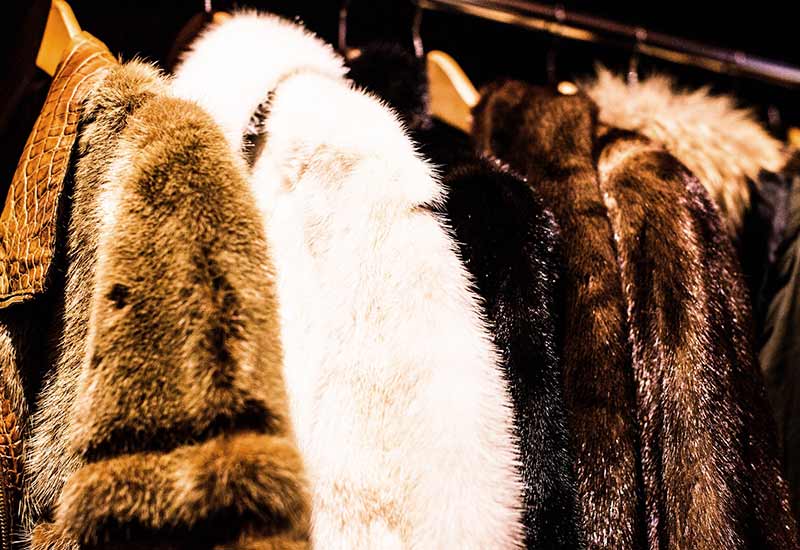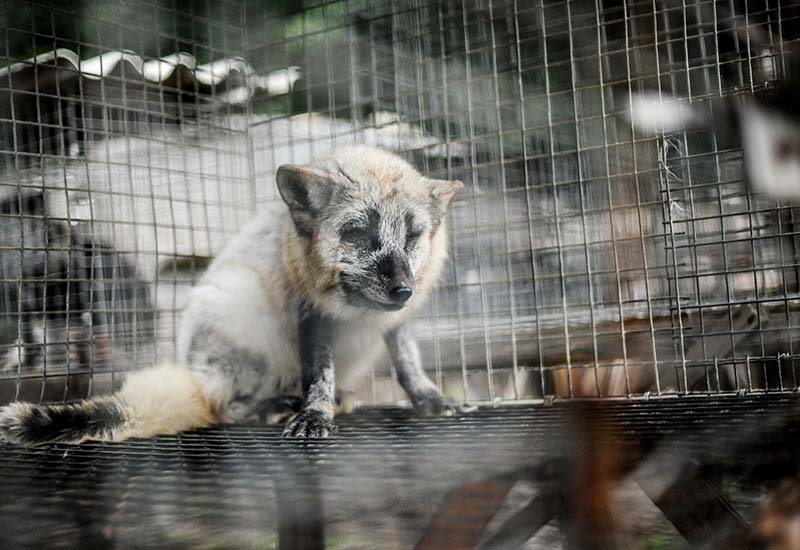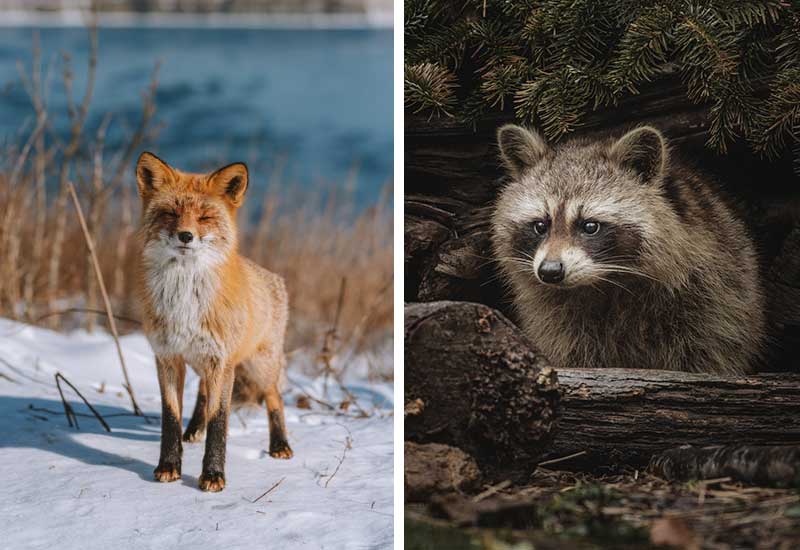Looking for interesting fur statistics and general facts and figures about the fur industry? Then you've come to the right place! A large part of all clothing now contains animal material. Especially popular: real fur! But as chic and inconspicuous as it may appear as a fluffy pom-pom on a hat or on the collar and hood of a winter jacket, there is often a cruel story behind it. And it is precisely this that I would now like to make a little more tangible for you with the help of some statistics.
In this article you will therefore find the most important data and figures around the fur industry - from general statistics, clothing, locations, the animals themselves to the prevailing opinion on the Fur industry in our society.
In advance here is a short Table of contents for the contribution:
My please: If you use any of the furry statistics from this post on the internet or elsewhere, please cite the following source. Thank you so much for your support!
https://www.careelite.de/pelz-statistiken-fakten-pelzindustrieGeneral statistics and figures on the fur industry
Here, I'll start by giving you some facts that you can use to get an initial idea of the extent of the fur industry:
- About 15 percent of the world's traded furs come from animals from hunting.₁
- Between 80 and 85 percent of the pelts in the fur trade today one produces in industrial fur farms.₂
- Worldwide, 44.4 million mink and 7.8 million foxes alone are killed annually for fur production. According to estimates, a total of over 90 million animals a year give their lives for the fur fashion.₃
- Also the skins of about one billion Rabbit and two million Dogs and cats end up on the market as fur products every year.₄
- In Denmark in 2020, due to the Corona pandemic, about 19 million minks gassed be.₅
- During the tanning of the fur comes approx. 100 different, environmentally harmful chemicals for use.₆
Statistics on clothing from furs and skins

Also regarding the fur clothing there are data and numbers worth knowing, which I would not like to withhold from you:
- For a single fur coat about 50 minks, 12 foxes or 150 chinchillas have to give up their lives.₇
- Worldwide, according to the International Fur Association. In 2016, about 75 million mink furs worth around 1.97 billion euros produced.₈
- It takes about 20 times more energy to produce a mink coat than it does to produce a synthetic fur.₉
- The Turnover of the fur products manufacturing industry in Germany was 35.6 million euros in 2019 and has been steadily declining since 2012.₁₀
Facts and figures about locations and fur farms
The production and trade of real fur is now illegal in many places, but still far from everywhere. Here are some fur statistics that might interest you:
- In China, about 50 percent of all fur products traded worldwide are produced.₁₁
- According to research by the German Animal Welfare Office, there are in Poland 800 to 1000 fur farms with a total of about five million animals.₁₂
- Round 60 percent of all animals in the fur industry are kept in Europe and skinned. There are about 5000 fur farms in the EU member states alone.₁₃
- Some European countries, such as Luxembourg, Croatia, Norway, Macedonia, Austria, Serbia, Slovakia, Slovenia, the Czech Republic, and Belgium have Fur already banned.₁₄
Facts & figures about the animals in the fur industry itself

There is no question that for fur Animals tortured become. Foxes, minks and other animals are not only kept in cramped cages, but are also killed using cruel methods such as gassing or anal electrocution. But as long as you don't see the suffering with your own eyes, it's easy to ignore it and leave things as they are. Here are fur statistics on the animals themselves that are guaranteed to open your eyes:
- It takes about 60-180 seconds, until the anesthesia sets inwhen minks are gassed with carbon monoxide.₁₅
- A mink would live in freedom about 7-10 years. In captivity, the animals are killed at the baby age of 6 months.₁₆
- The Precinct of a wild fox is about 20 million times larger than its cage in a fur farm.₁₇
- 90 percent of the animals caught in traps do not belong to the species for which the traps were originally set.₁₈
- 70 percent of all minks in captivity show Behavioral disorders.₁₉
What is society's opinion of the fur industry?
Finally, one last statistic about the general opinion towards "fur production" in our society:
- A GfK survey conducted in 2016 shows that around 80 percent of Germans have a Ban on fur farms endorse.₂₀
These survey results confirm that the majority of Germans do not consider animal fur a necessary part of clothing and could do without it.
Use fur statistics, facts & figures to educate!

To be able to wear fur clothing, we keep wild animals captive, torture and kill them. And this despite the fact that we can simply wear other garments made from natural raw materials free from animal suffering. Therefore, abandon fur. Preferably also on artificial fur - because even if it is mostly environmentally and definitely animal-friendly, it also looks deceptively real and thus contributes to the fact that fur fashion continues to find acceptance in our society. In addition, motivate other people to think about the background of the fur trade and to get involved. to work for the animals in everyday life.
One more thing: if despite these facts you still absolutely want to wear the fluffy accessories, make the purchase the Real fur test.
I hope I've been able to give you a more tangible picture of the creepy industry with these fur stats. Do you have any questions, suggestions or more facts? As always, feel free to drop me a comment.
Be always kind to animals,

PS.: The fur trade is only one of the reasons, why i live vegan. In the linked article you will learn what else motivates me to do so. Have fun!
References:
₁,₄,₉,₁₁ PETA Deutschland e.V.: The truth about fur: 10 shocking facts! (as of April 2012), available at https://www.peta.de/themen/pelzwahrheiten. [12.08.2021].
₂,₃,₇,₁₃,₁₆,₁₇,₁₉,₂₀ animal public e.V.: Facts and figures on fur, available at https://t1p.de/petg. [12.08.2021].
₅,₈,₁₂ M. Brauer: Millions of minks must die because of Corona (as of 05.11.2020), available at https://t1p.de/7dhw [12.08.2021].
₆ Nachhaltig-sein.info: Why fur is back or was never gone: The Fur World in Numbers (infographic, 2013), available at https://t1p.de/6u50. [12.08.2021].
₁₀ Statista GmbH (2021): Umsatz der Branche Herstellung von Pelzwaren in Deutschland von 2012 bis 2019 und Prognose bis zum Jahr 2025, available at https://de.statista.com/prognosen/924712/herstellung-von-pelzwaren-umsatz-in-deutschland. [12.08.2021].
₁₄ PETA Deutschland e.V.: Fur ban: Fur is banned in these countries and cities (as of June 2021), available at https://www.peta.de/themen/pelzverbot. [12.08.2021].
₁₅ Edmund Haferbeck (1990): Fur farming - the senseless dying. Göttingen: Echo Verlag.
₁₈ Verein Gegen Tierfabriken: Background Knowledge Fur, available at https://vgt.at/projekte/pelz/fakten.php. [12.08.2021].





